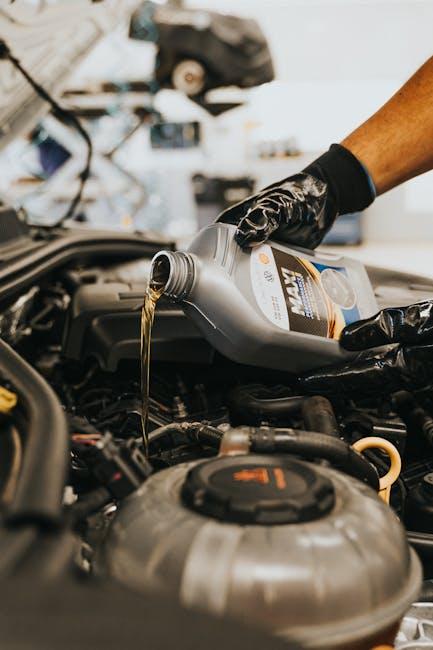In the vast and intricate world of automotive care, oil is often hailed as the lifeblood that keeps engines humming smoothly. Yet, beneath this seemingly simple substance lies a nuanced debate: synthetic versus conventional oil. Each has its own history, composition, and benefits, catering to different needs and driving styles. As vehicles become increasingly sophisticated and environmental concerns grow louder, understanding the distinctions between these two types of motor oil is more important than ever. This article aims to peel back the layers of this oily debate, exploring the science and practicality behind synthetic and conventional oil, to help drivers make informed choices for their engines’ longevity and performance.
Table of Contents
- Understanding the Fundamental Differences Between Synthetic and Conventional Oil
- The Impact of Oil Choice on Engine Performance and Longevity
- Evaluating Cost Efficiency Over the Lifetime of Your Vehicle
- Environmental Considerations and Sustainability Factors
- When to Opt for Synthetic Oil Based on Driving Habits
- Making the Right Oil Selection for Your Car’s Warranty and Maintenance Schedule
- Q&A
- Final Thoughts

Understanding the Fundamental Differences Between Synthetic and Conventional Oil
At their core, synthetic and conventional oils serve the same primary purpose: to lubricate your engine. However, the journey each takes to achieve this differs vastly. Synthetic oils are engineered through a meticulous chemical process, refining base oils and blending them with advanced additives. This results in a cleaner, more uniform molecular structure that offers superior performance under extreme temperatures and conditions. Conversely, conventional oils are derived directly from crude oil with minimal processing. While they provide adequate lubrication for everyday driving, their molecular makeup is less consistent, which can lead to quicker breakdowns and reduced efficiency over time.
Understanding these differences can clarify why synthetic oils often outperform their conventional counterparts. Consider the following key attributes:
- Viscosity Stability: Synthetic oils maintain their thickness longer across fluctuating temperatures.
- Engine Cleanliness: Their uniform molecules resist sludge and deposits better.
- Longevity: Extended drain intervals reduce the frequency of oil changes.
- Cost Efficiency: While pricier upfront, synthetics may save money long-term through improved engine health.
| Feature | Synthetic Oil | Conventional Oil |
|---|---|---|
| Base Composition | Man-made, highly refined | Crude oil-derived |
| Performance in Extremes | Exceptional | Moderate |
| Price | Higher | Lower |
| Change Interval | 10,000+ miles | 3,000-5,000 miles |

The Impact of Oil Choice on Engine Performance and Longevity
Choosing the right oil profoundly influences not only how your engine performs but also how long it lasts. Synthetic oils are engineered with advanced additives and uniform molecular structures that provide superior lubrication under extreme temperatures and pressures. This results in a reduction of engine wear, improved thermal stability, and enhanced fuel efficiency. Conversely, conventional oils, derived from crude oil, may break down quicker under stress, leading to more frequent oil changes and a greater chance of sludge buildup that can impede engine parts.
Beyond wear prevention, the type of oil also affects engine cleanliness and protection from corrosion. Here’s a quick comparison:
- Synthetic Oils: Better oxidation resistance, fewer deposits, and superior cold-start performance.
- Conventional Oils: More affordable but with less resistance to breakdown and deposit formation.
| Feature | Synthetic Oil | Conventional Oil |
|---|---|---|
| Temperature Tolerance | Excellent (-40°C to 250°C) | Good (-20°C to 150°C) |
| Engine Wear Protection | High | Moderate |
| Oil Change Interval | 10,000 – 15,000 miles | 3,000 – 5,000 miles |
| Cost | Higher | Lower |

Evaluating Cost Efficiency Over the Lifetime of Your Vehicle
When it comes to selecting the ideal motor oil, cost efficiency isn’t just about the initial price tag at the pump. It’s essential to consider how your choice impacts your vehicle’s performance and maintenance over time. Synthetic oils, while typically higher in upfront cost, often extend the intervals between oil changes due to their superior stability and resistance to breakdown. This means fewer trips to the service station and potentially fewer top-ups, making the investment worthwhile for many drivers. Conversely, conventional oils might require more frequent changes, which can add up in labor and product costs over the years.
To better illustrate the lifetime savings, take a look at this simple comparison:
| Oil Type | Change Interval | Average Cost per Change | Annual Maintenance Cost |
|---|---|---|---|
| Synthetic Oil | 10,000 – 15,000 miles | $70 | $140 – $210 |
| Conventional Oil | 3,000 – 5,000 miles | $30 | $180 – $300 |
- Longevity: Synthetic oils reduce wear and tear, extending engine life.
- Fuel Efficiency: Improved lubrication can lead to marginally better gas mileage.
- Environmental Impact: Fewer changes mean less oil waste to manage.
Ultimately, while synthetic oil demands a heftier initial investment, the benefits of longer oil change intervals, enhanced engine protection, and potential fuel savings translate to smarter spending across the vehicle’s lifespan.
Environmental Considerations and Sustainability Factors
When it comes to choosing between synthetic and conventional oil, the environmental footprint is a crucial factor. Synthetic oils are formulated through advanced chemical processes, which often result in a more efficient use of raw materials and a longer-lasting product. This extended lifespan means fewer oil changes are needed, directly reducing the volume of waste oil generated and the frequency of packaging disposal. Additionally, synthetic oils tend to have better thermal stability and lower volatility, helping engines run cleaner and emit fewer harmful pollutants over time.
Conventional oils, while typically less expensive upfront, may require more frequent replacements, contributing to greater environmental strain. The extraction and refining of crude oil, the base for conventional lubricants, also impact ecosystems and contribute to greenhouse gas emissions. Below is a comparison summary highlighting key sustainability factors:
| Factor | Synthetic Oil | Conventional Oil |
|---|---|---|
| Resource Use | More efficient synthesis | Relies on crude oil extraction |
| Oil Change Frequency | Fewer changes needed | Requires frequent changes |
| Waste Generation | Lower waste volume | Higher waste production |
| Emissions Impact | Reduces engine emissions | Higher emissions potential |

When to Opt for Synthetic Oil Based on Driving Habits
Choosing synthetic oil becomes especially advantageous when your driving style or conditions push your vehicle beyond the norm. If you frequently engage in stop-and-go city traffic, endure extreme weather conditions, or often embark on long highway journeys, synthetic oil’s enhanced stability and resistance to breakdown can offer superior protection. For those who enjoy spirited driving or towing heavy loads, synthetic oil’s ability to maintain consistent viscosity under high engine stress makes it an ideal companion, ensuring your engine runs smoother and cooler.
Consider the following typical driving habits where synthetic oil shines:
- Frequent short trips where the engine doesn’t reach optimal operating temperature
- Extreme temperatures, both hot or cold, demanding quick lubrication
- Driving in dusty or dirty environments resulting in more contaminants
- High-performance or turbocharged engines requiring advanced protection
| Driving Habit | Why Synthetic Works Better |
|---|---|
| Frequent Short Trips | Reduces engine wear due to better cold start protection |
| Hot Climates | Withstands higher temperatures without thinning |
| Towing and Heavy Loads | Maintains consistency under extreme engine stress |
| Performance Driving | Improves engine responsiveness and reduces deposits |

Making the Right Oil Selection for Your Car’s Warranty and Maintenance Schedule
Choosing the appropriate oil for your car not only ensures optimal engine performance but also aligns perfectly with your vehicle’s warranty and maintenance schedule. It’s crucial to consult your owner’s manual to see if your manufacturer recommends synthetic oil or if conventional oil is acceptable. Synthetic oils typically provide superior protection against engine wear, perform better under extreme temperatures, and resist oxidation longer, making them ideal for high-performance engines or vehicles driven in harsh conditions. On the other hand, conventional oils can be perfectly adequate for older models or those with low mileage, often coming at a more budget-friendly price point.
When considering maintenance schedules, remember oil change intervals vary significantly depending on the oil type you choose. Here’s a quick breakdown:
| Oil Type | Recommended Change Interval | Warranty Compatibility |
|---|---|---|
| Synthetic | 7,500 – 15,000 miles | Often required for new vehicles |
| Conventional | 3,000 – 5,000 miles | Acceptable for older models |
- Verify: Manufacturer’s oil specification and grade
- Monitor: Oil performance and any vehicle alerts
- Adjust: Oil change frequency based on driving conditions
By following these guidelines, you can ensure your oil choice supports your car’s longevity and keeps your warranty intact without compromising on performance or protection.
Q&A
Q&A: Synthetic vs Conventional Oil – What’s Under Your Hood?
Q1: What exactly is synthetic oil, and how does it differ from conventional oil?
A: Synthetic oil is a man-made lubricant engineered with uniform molecules designed to reduce engine wear and improve performance. Conventional oil, on the other hand, is derived directly from crude oil with natural variations in its molecular structure. Think of synthetic oil as a precision-crafted suit, while conventional oil is more like off-the-rack clothing—both serve the purpose, but one fits and performs with greater finesse.
Q2: Why should I consider synthetic oil over conventional oil for my car?
A: Synthetic oil offers superior thermal stability, better flow at low temperatures, and enhanced protection under extreme driving conditions. This means your engine stays cleaner and runs smoother, especially in hot, cold, or high-stress environments. Conventional oil does the job for everyday driving but may break down faster and provide less consistent protection.
Q3: Are synthetic oils always more expensive than conventional oils?
A: Initially, yes—synthetic oils typically come with a higher price tag at the pump. However, because synthetics last longer and protect your engine more effectively, they may save you money over time by extending oil change intervals and reducing engine wear-related repairs.
Q4: Can synthetic oil damage older engines or high-mileage vehicles?
A: There’s a common myth that synthetic oil might “clean” too well and cause leaks in older engines. Modern synthetic oils are formulated to be compatible with various engine types, including high-mileage ones. It’s wise to use synthetic oils specially designed for older engines if your vehicle has higher mileage, but generally, synthetic poses no harm.
Q5: How should I decide which oil is right for my car?
A: Always start by checking your vehicle manufacturer’s recommendations. Consider your driving habits, climate, and budget. If you frequently drive in extreme temperatures or demand high performance, synthetic oil might be the smarter choice. For moderate driving in temperate climates, conventional oil can suffice. Ultimately, quality and consistency in oil maintenance matter most.
Q6: Is there a middle ground between synthetic and conventional oil?
A: Yes! Synthetic blend oils combine conventional oil with a percentage of synthetic base oils, offering improved protection and performance compared to standard conventional oils but at a lower cost than full synthetics. It can be a practical compromise for many drivers.
Q7: Does switching to synthetic oil void my car’s warranty?
A: Generally, no. Vehicle warranties typically cover any oil that meets the manufacturer’s specifications, regardless of whether it’s synthetic or conventional. Just keep records of your oil changes and use oils approved by your carmaker to stay on the safe side.
Q8: What’s the takeaway on synthetic vs conventional oil?
A: Both types of oil have their merits and place in the automotive world. Synthetic oil is the high-performance, high-protection choice, especially for challenging conditions. Conventional oil remains a reliable, cost-effective option for routine driving. Knowing your vehicle’s needs and maintaining consistent oil changes will keep your engine singing no matter which oil you choose.
Final Thoughts
In the end, the choice between synthetic and conventional oil isn’t simply a matter of black and white—it’s a nuanced decision shaped by your vehicle’s needs, driving habits, and budget. Synthetic oils offer advanced protection and performance, while conventional oils provide a time-tested, cost-effective option. Understanding the strengths and limitations of each lets you navigate the oily crossroads with confidence, ensuring your engine hums smoothly on every mile ahead. Whether you opt for synthetic’s cutting-edge chemistry or the faithful reliability of conventional blends, your car’s health is ultimately in your hands.

